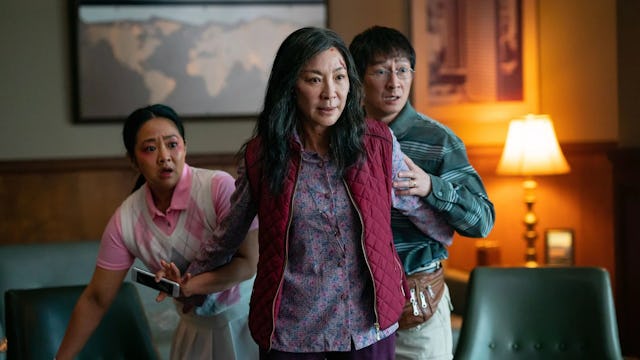4 Powerful Parenting Truths In Everything Everywhere All At Once
My son's favorite film is also a fascinating look at our relationship with our kids as they grow into teens.

If someone had told me that this film runs over two hours, has subtitles, and is about the multiverse, I probably would not have watched it. But as it was, my son’s child therapist said, “You guys should see a movie together,” and by “a movie,” she meant this very specific movie, Everything Everywhere All at Once. That was back in the spring, when it came out, and Joe and I dutifully went. The movie blew our minds. It’s since gone on to win the Gotham Award for Best Feature of 2022, and it’s sure to win more during award season.
For Joe, 17, the movie is about non-duality and the rejection of nihilism, religious and philosophical ideas he studied once the pandemic upended his young world. For many, including the creators, the film centers on the immigrant family experience. But it’s also about parenting, which hit me the hardest now that I’ve raised two kids to near-adulthood.
Briefly: Michelle Yeoh plays a mom whose husband (Ke Huy Quan, already winning awards for his role) and teen daughter annoy her. She’s trying to hold their home and business together while her estranged father comes to visit from China. If you’re a working parent with judgy parents of your own — or heck, if you’re anyone who has ever had to pay taxes — you’ll sympathize with her from scene one. The movie goes gonzo from there, but the parenting truths continued to resonate for me.
Truth: Our parenting love language can be, as the film might say, f-ing weird.
“Joy,” the mom character says. “You’re getting fat.” That’s how she tells her daughter, “I see you, and I care about you.” Joy, fortunately, understands this, though the words are still hurtful.
At home, I spend some part of every evening lecturing my son to do his homework. It isn’t because I care about his homework. I care about him, and I want him to graduate high school and get on to better things. I love him, but I show it by fussing at him, like many of us do with older kids. I also feed him and do his laundry and all those other acts of service representing one of the five love languages. But after seeing this movie, I feel like there should be a sixth love language added to the rest: nagging your kid because you care so dang much.
I suppose that telling kids what to do feels more “parent-y” than saying, “I love you just the way you are, without you doing anything right now.” But the movie reminded me that I can, at the very least, do less of the fussing and more of the loving.
Truth: If your kid jumped off a cliff, you’d probably follow.
I told you this is a multiverse movie, right? At one point, mom and daughter are literally rocks. The mom attempts to inch over to her daughter, to love her — kind of like I noted above, to do less fussing and more loving. The daughter is not having it, the way a teen might recoil from your hug as if you’re poison. In fact, the daughter rock tosses herself over the cliff. Mom rock follows.
This is the way life is with a kid, and the scene made me cry when I saw it both the first and the second time. We often say we’d throw ourselves in front of a car for our kids, and while that’s true, what we actually do is follow them into their adolescent sadnesses and depressions and do our best to be there for them, whether they seem to want us or not. When they act like they don’t want us, they probably really need us.
Truth: Kids are chaos agents.
I mean, I know you don't need a movie to tell you that kids upend your world. But this movie turns the daughter (played brilliantly by Stephanie Hsu) into the ultimate danger, out to destroy the entire universe, and it's both hilarious and on point. They know so precisely how to push all of our buttons.
In addition to making kids kinda terrifying, though, the movie keeps returning to the simple fact that children mostly want us to be proud of them, be there for them, see them for who they genuinely are, and put their needs first where we can. "I was just looking for someone who could see what I see, feel what I feel," says Joy in her villain mode to the mom she tracks down from universe to universe.
Truth: "Of all the places I could be, I will always want to be here with you."
This is the end of the movie, a line spoken by Yeoh's character to her daughter, and the film's crux. As parents and kids, we're joined at the hip in the baby years but then keep moving seemingly further apart. By the time kids are teens, they seem to not want to be with us, and we seem to barely tolerate them.
But the simple truth is, given the choice, we'd always be together. Also: Kindness is our secret weapon to heal all the hurts in the world, and it's best used with each other.
Is that super sappy? Just see the movie. I promise it is also hilarious, filled with insane action sequences, and so creatively crazy that you may have to watch it again to catch certain scenes. I loved seeing it with my son (though note that Common Sense Media grades it as appropriate for ages 15+, so it's not for little kids). And yes, I also cried at the end each time I saw it, but that's because I'm a parent.
This article was originally published on